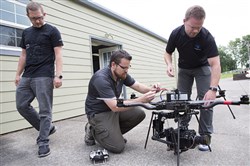VOL. 41 | NO. 20 | Friday, May 19, 2017
Tennessee’s film industry gets a lift
By Joe Morris
Nashville spends plenty of time and money hawking the Music City brand, but it’s also been quietly and successfully building a solid film and television production community for years.
Some of the companies that inhabit that space aren’t a surprise; in a town full of record labels and music-oriented television networks like CMT, music video production would be expected to thrive. It does, but non-music related film and television production is in a healthy place here as well, says Bob Raines, director of the Tennessee Entertainment Commission.
“Tennessee ranks seventh in the nation for employment in motion-picture production in terms of the industry cluster here, which shows that we have a strong creative class,” Raines says.
“Considering the large industries in states like California, New York and Louisiana, and cities like Atlanta that have a large presence, the fact that we’re still in the top 10 for the industry and for employment is something we’re very proud of.”
Tennessee Film/Video by the numbers:
- 4,395 full-time workers
- 220 business locations
- 12 percent growth from 2010-2016
- 9.3 percent projected growth – next 5 years
- $228.3 million in income for Tennessee workers (based on 50 incentivized productions between 2007-2015)
- $34 million in incentives paid out for those projects
- 7,300 production days for those projects
- $370.8 million in economic output for the state in that time period
Source: Bob Raines, Tennessee Entertainment Commission
The state’s production community, which includes both movie and television work – which itself breaks down into commercial, series, music video and other subcategories – has grown by 12 percent in the last six years. The next five years will see another 9.3 percent growth, Raines adds, with much of that located in the rapidly expanding Middle Tennessee area.
And, he adds, the jobs are solid.
“This sector produces high-quality jobs,” Raines explains. “Workers in this sector earn an average of $60,000 a year, which is about 21 percent higher than the average wage for other industries in the state.

Behind the scenes at the filming of the TV show “Nashville.” The show has spent $225 million during the past five years.
-- Submitted“Also, most workers in film and television production tend to have post-secondary education, and so this growth is fueling enrollment in related entertainment programs at institutions offering degree programs in film and television production, so we are growing our own talent.”
The state has aggressively sought the entertainment industry by offering incentives, and local governments have followed suit. The television show “Nashville’’ has, in particular, capitalized on its namesake city’s largesse to the tune of $31 million over the show’s first four seasons from the state, and more than $2 million from Metro Nashville between 2014-2016, which watchdog organizations like Tennessee Tax Revolt have called corporate welfare and an unfair subsidy.
Raines, like local officials, is quick to rebut those charges and touts the ongoing economic benefits of being a production hub.
“In 2001, Louisiana made the first shot over the bow to answer runaway production in Canada,” Raines adds. “They set production incentives of about 30 percent, and then other states got into it in an effort to bring this money out of Southern California.

Pilot Alan Boyle, left, co-founder/pilot Spencer Valdez and Ben Linderman, director of marketing and media, all with Snaproll Media, set up one of their drones for takeoff. The company is one of the first six approved by the Federal Aviation Administration to fly the small aircraft for film and television productions.
-- Michelle Morrow | The Ledger“Georgia and Louisiana take the top post, but here we’ve seen strong growth in a skill set and workforce that we didn’t have 30 years ago. We are bringing a lot of people, and a lot of money, into our orbit, and incentives are the No. 1 tool for that.”
For all its detractors, “Nashville’’ has its share of fans, as well, hence the willingness to keep funding its incentives. In fact, Raines says, even though the show left network television to move to cable, it’s still a potent draw when it comes to advertising the state’s amenities.
“It’s made my phone ring a lot more and helped establish Nashville and Tennessee on a national level in terms of making people aware that we have the crew base and facilities to handle a prime-time television show,” he points out.

Bob Raines
-- Submitted“A TV series is like setting down an automobile factory. Once you set that down in an area, suppliers start popping up all around it. I’ve been going out and talking about what we can do for years, and now I can point to this, and those conversations go a lot more smoothly.”
Local operators agree that having an elevated profile helps bring in more business, and also note that with more productions comes more competition. In that, they’re feeling the rapid growth of Nashville just like other industries in a town – adding hundreds of people each week.
“In the past four years, we’ve converted to doing at least half of our work in long-form television, feature film or documentary work, which has always been our ultimate goal,” says Gabe McCauley, co-owner of lilDRAGON, which officially opened in 2002 although McCauley had been living and working here for a few years prior.
“We began doing video production, marketing and commercial work, and things like music-video press kits and live event videos, and growth was there, but fairly slow. We still have our corporate clients, but now we have films in development, we’ve produced a feature film, “Heaven Bound,’’ that has gone to theater and DVD release and produced several seasons of the “Joey + Rory Show.’”
McCauley says Nashville further legitimized an already-valid production scene in Middle Tennessee, and adds that incentives will continue to play a role here, just as they do in other states.
“I’m not a fan of corporate bailouts, and I can see why some people would criticize them, but I do see how they work,” he says. “If we had more, I think we’d be seeing more feature film work here, beyond the ones we have now that are fairly small-budget productions.
“There are more than enough people here now to do the work, and we’re even fighting a little bit now for jobs. There are a lot of choices, which means that clients have a lot of people to pick from, and while that’s good for them, it’s made things more competitive for us.”
Some local companies have found a way to have a foot in each camp, maintaining a Nashville working and R&D presence while also taking part in productions elsewhere. For instance, 13-year-old Snaproll Media is busy flying drones all over the place, and it has been ever since it became one of the first six companies approved by the Federal Aviation Administration to fly the small aircraft for film and television productions. (Demo video: www.youtube.com/watch?v=8lfZoWneWfk&feature=youtu.be)
“We are all from the area, and so we wanted to build our business here,” says Ben Linderman, director of marketing. “Plus, this is a great hub to other parts of the country in terms of easy travel. We can drive or fly – the majority of us are pilots as well – to get to where we need to be.”
Snaproll has evolved and changed over the years alongside its industry, both in Middle Tennessee and in general. The company’s founders engineered remote-controlled helicopters with a means to point a mounted camera in different directions, and then over time developed ways to stabilize and control those shots.
They shot a lot of music industry work in those early years, Linderman says, and eventually kept developing and enhancing their drone technology and growing exponentially.
“Once the cinema industry adopted this technology, we got the chance to fly one of the industry’s leading cameras because we created a platform to do that,” Lindeman adds.
“That created a pretty big spike of interest in our business, as well.”
The company can fly high-end and heavy 3-D rigs, which means they can participate in just about any kind of shoot, even for IMAX productions. The sky literally is the limit, including the sky over Middle Tennessee.
“We have a local client base, but our goal is to be everywhere,” Linderman explains. “Right now there’s a lot of work being done here that doesn’t always fit our services, but we’re seeing an aggressive curve in terms of more productions coming here because of all the people who already are in Nashville.
“There’s network TV being filmed here, movies, videos for all kinds of music genres, a lot of things that provide us, and a lot of other people, with opportunities for work.’’